The Role of Leadership in Strategic Quality Management in UAE
VerifiedAdded on 2023/06/07
|8
|1580
|57
Project
AI Summary
This research proposal explores the pivotal role of leadership in implementing total quality management within the higher education sector of the UAE. The project aims to investigate the link between strategic management and higher education, outline effective strategies for leadership to enhance quality management, and identify challenges while providing actionable recommendations for improvement. The study focuses on the higher education sector, analyzing its strengths, weaknesses, opportunities, and threats through a SWOT analysis. The research will employ a quantitative research design, utilizing systematic review of secondary data, and is expected to be completed within thirty days. The proposal includes learning objectives, a detailed methodology, and a comprehensive outline to ensure the research question is answered appropriately, contributing to the enhancement of quality management practices in UAE's higher education landscape. The assignment is designed to meet the requirements of the Integrative Industry Project (BUS 4956).
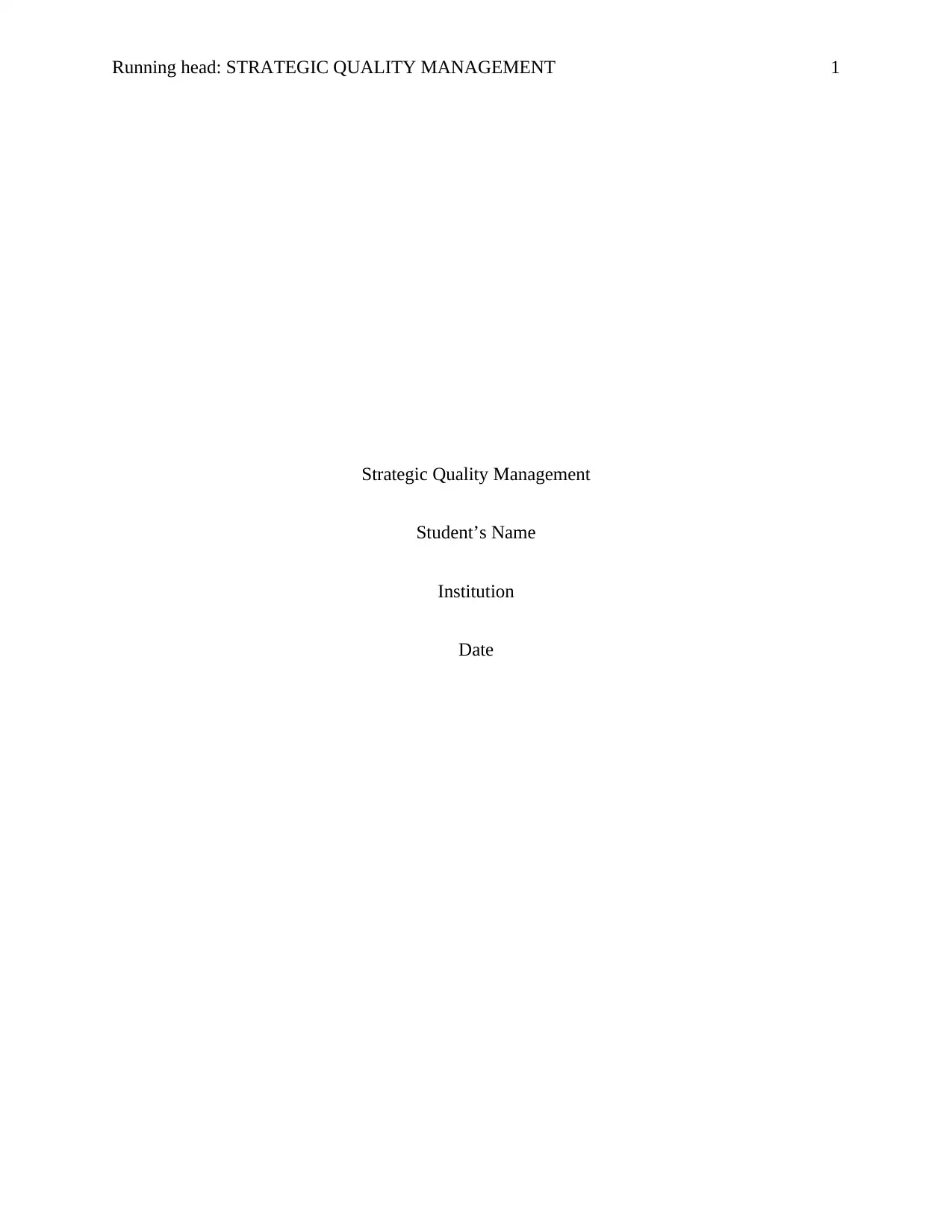
Running head: STRATEGIC QUALITY MANAGEMENT 1
Strategic Quality Management
Student’s Name
Institution
Date
Strategic Quality Management
Student’s Name
Institution
Date
Paraphrase This Document
Need a fresh take? Get an instant paraphrase of this document with our AI Paraphraser
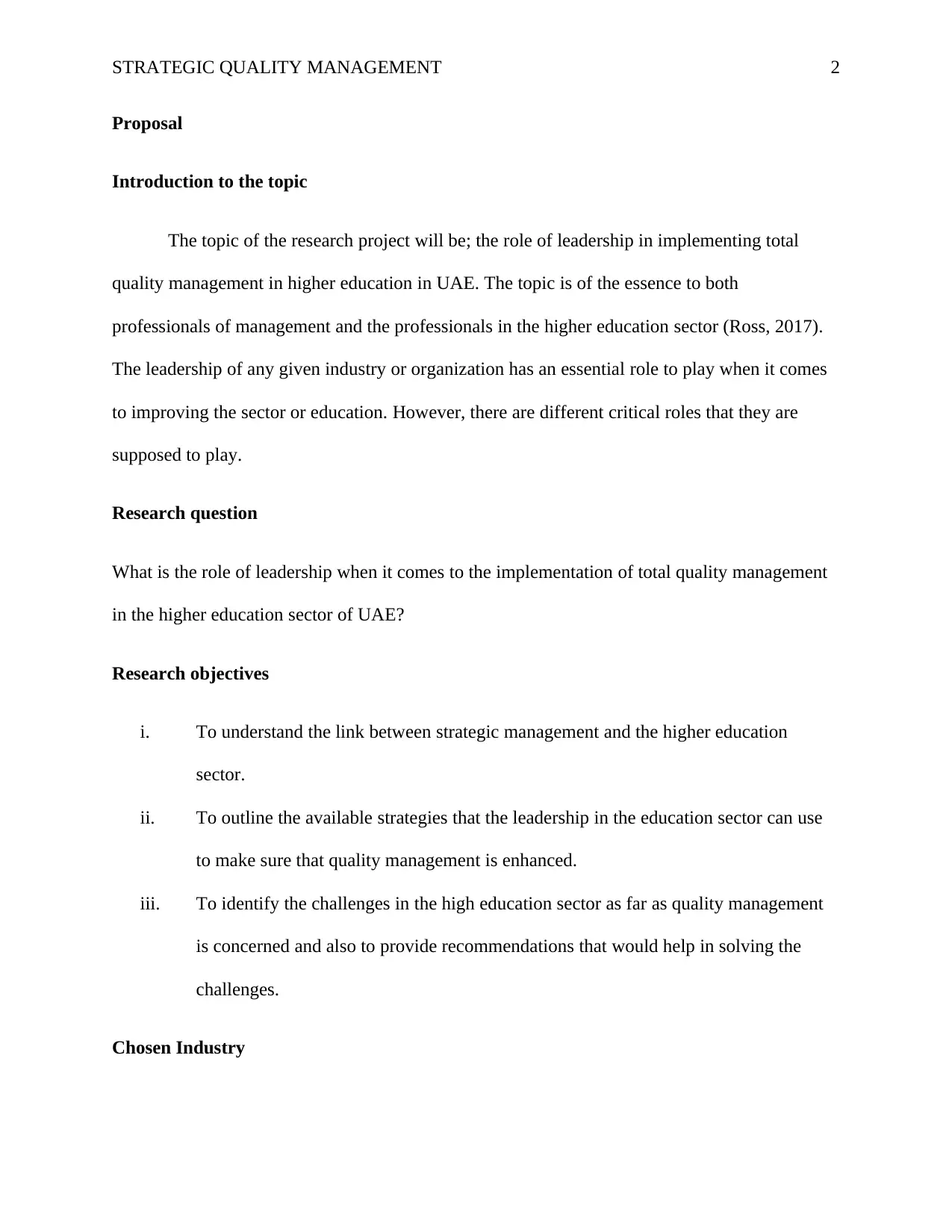
STRATEGIC QUALITY MANAGEMENT 2
Proposal
Introduction to the topic
The topic of the research project will be; the role of leadership in implementing total
quality management in higher education in UAE. The topic is of the essence to both
professionals of management and the professionals in the higher education sector (Ross, 2017).
The leadership of any given industry or organization has an essential role to play when it comes
to improving the sector or education. However, there are different critical roles that they are
supposed to play.
Research question
What is the role of leadership when it comes to the implementation of total quality management
in the higher education sector of UAE?
Research objectives
i. To understand the link between strategic management and the higher education
sector.
ii. To outline the available strategies that the leadership in the education sector can use
to make sure that quality management is enhanced.
iii. To identify the challenges in the high education sector as far as quality management
is concerned and also to provide recommendations that would help in solving the
challenges.
Chosen Industry
Proposal
Introduction to the topic
The topic of the research project will be; the role of leadership in implementing total
quality management in higher education in UAE. The topic is of the essence to both
professionals of management and the professionals in the higher education sector (Ross, 2017).
The leadership of any given industry or organization has an essential role to play when it comes
to improving the sector or education. However, there are different critical roles that they are
supposed to play.
Research question
What is the role of leadership when it comes to the implementation of total quality management
in the higher education sector of UAE?
Research objectives
i. To understand the link between strategic management and the higher education
sector.
ii. To outline the available strategies that the leadership in the education sector can use
to make sure that quality management is enhanced.
iii. To identify the challenges in the high education sector as far as quality management
is concerned and also to provide recommendations that would help in solving the
challenges.
Chosen Industry
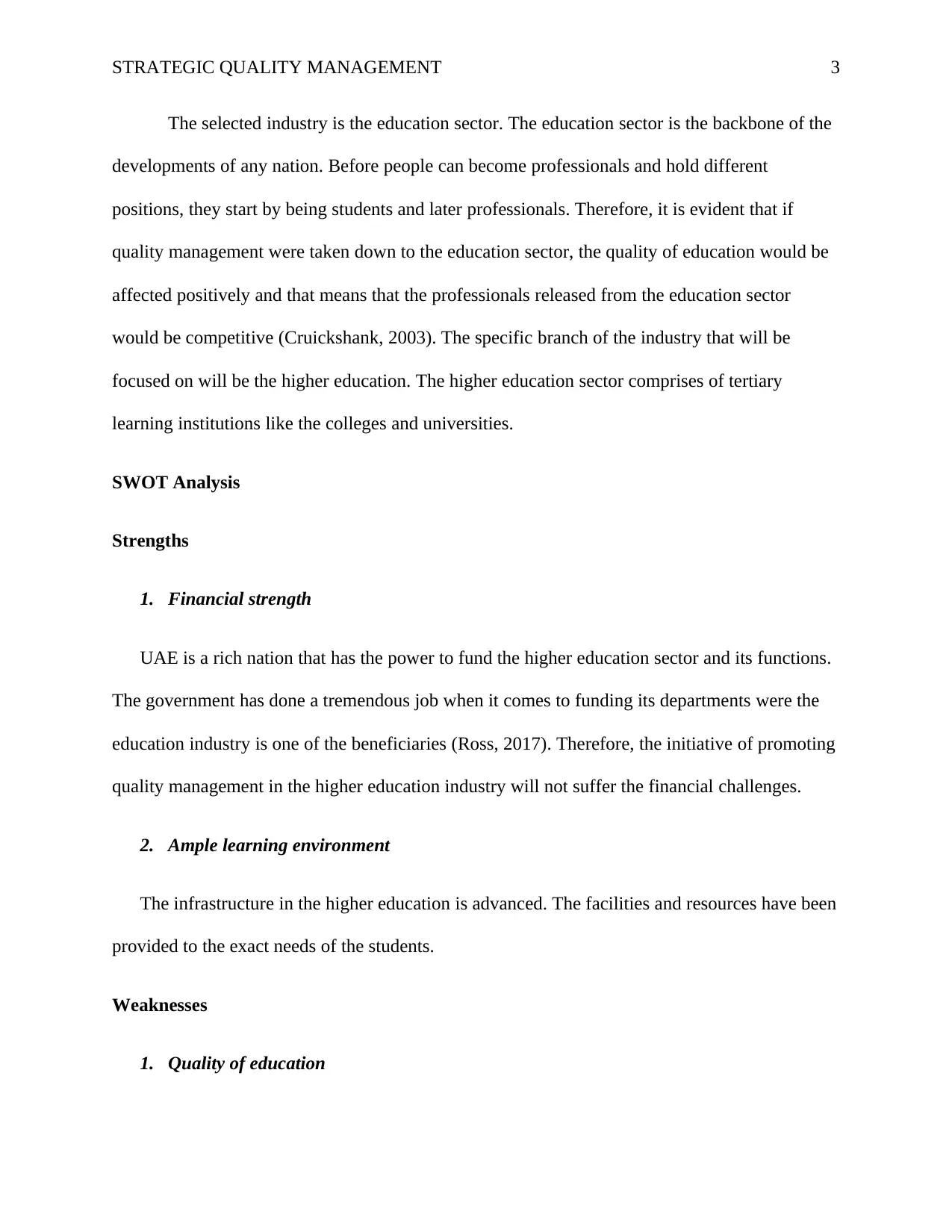
STRATEGIC QUALITY MANAGEMENT 3
The selected industry is the education sector. The education sector is the backbone of the
developments of any nation. Before people can become professionals and hold different
positions, they start by being students and later professionals. Therefore, it is evident that if
quality management were taken down to the education sector, the quality of education would be
affected positively and that means that the professionals released from the education sector
would be competitive (Cruickshank, 2003). The specific branch of the industry that will be
focused on will be the higher education. The higher education sector comprises of tertiary
learning institutions like the colleges and universities.
SWOT Analysis
Strengths
1. Financial strength
UAE is a rich nation that has the power to fund the higher education sector and its functions.
The government has done a tremendous job when it comes to funding its departments were the
education industry is one of the beneficiaries (Ross, 2017). Therefore, the initiative of promoting
quality management in the higher education industry will not suffer the financial challenges.
2. Ample learning environment
The infrastructure in the higher education is advanced. The facilities and resources have been
provided to the exact needs of the students.
Weaknesses
1. Quality of education
The selected industry is the education sector. The education sector is the backbone of the
developments of any nation. Before people can become professionals and hold different
positions, they start by being students and later professionals. Therefore, it is evident that if
quality management were taken down to the education sector, the quality of education would be
affected positively and that means that the professionals released from the education sector
would be competitive (Cruickshank, 2003). The specific branch of the industry that will be
focused on will be the higher education. The higher education sector comprises of tertiary
learning institutions like the colleges and universities.
SWOT Analysis
Strengths
1. Financial strength
UAE is a rich nation that has the power to fund the higher education sector and its functions.
The government has done a tremendous job when it comes to funding its departments were the
education industry is one of the beneficiaries (Ross, 2017). Therefore, the initiative of promoting
quality management in the higher education industry will not suffer the financial challenges.
2. Ample learning environment
The infrastructure in the higher education is advanced. The facilities and resources have been
provided to the exact needs of the students.
Weaknesses
1. Quality of education
⊘ This is a preview!⊘
Do you want full access?
Subscribe today to unlock all pages.

Trusted by 1+ million students worldwide
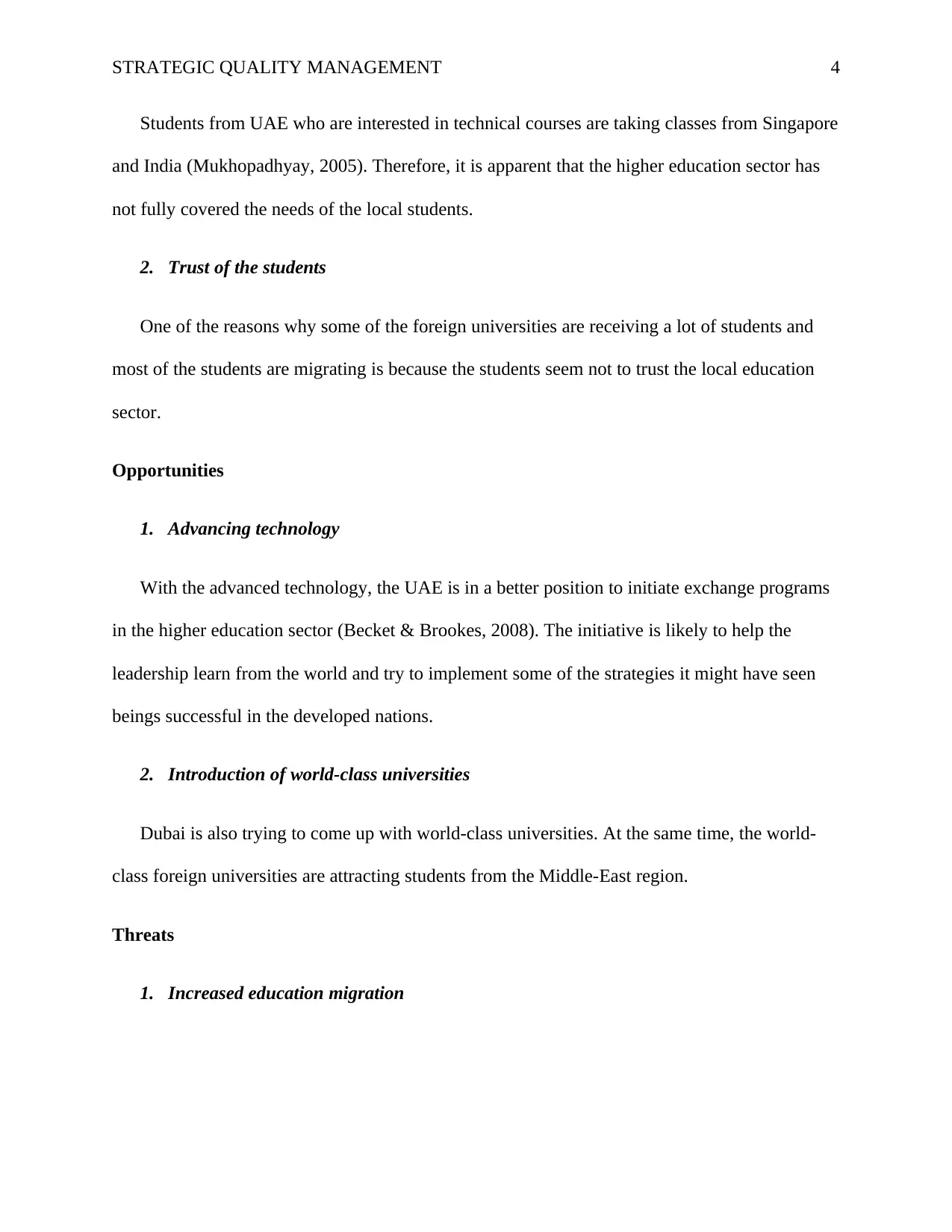
STRATEGIC QUALITY MANAGEMENT 4
Students from UAE who are interested in technical courses are taking classes from Singapore
and India (Mukhopadhyay, 2005). Therefore, it is apparent that the higher education sector has
not fully covered the needs of the local students.
2. Trust of the students
One of the reasons why some of the foreign universities are receiving a lot of students and
most of the students are migrating is because the students seem not to trust the local education
sector.
Opportunities
1. Advancing technology
With the advanced technology, the UAE is in a better position to initiate exchange programs
in the higher education sector (Becket & Brookes, 2008). The initiative is likely to help the
leadership learn from the world and try to implement some of the strategies it might have seen
beings successful in the developed nations.
2. Introduction of world-class universities
Dubai is also trying to come up with world-class universities. At the same time, the world-
class foreign universities are attracting students from the Middle-East region.
Threats
1. Increased education migration
Students from UAE who are interested in technical courses are taking classes from Singapore
and India (Mukhopadhyay, 2005). Therefore, it is apparent that the higher education sector has
not fully covered the needs of the local students.
2. Trust of the students
One of the reasons why some of the foreign universities are receiving a lot of students and
most of the students are migrating is because the students seem not to trust the local education
sector.
Opportunities
1. Advancing technology
With the advanced technology, the UAE is in a better position to initiate exchange programs
in the higher education sector (Becket & Brookes, 2008). The initiative is likely to help the
leadership learn from the world and try to implement some of the strategies it might have seen
beings successful in the developed nations.
2. Introduction of world-class universities
Dubai is also trying to come up with world-class universities. At the same time, the world-
class foreign universities are attracting students from the Middle-East region.
Threats
1. Increased education migration
Paraphrase This Document
Need a fresh take? Get an instant paraphrase of this document with our AI Paraphraser
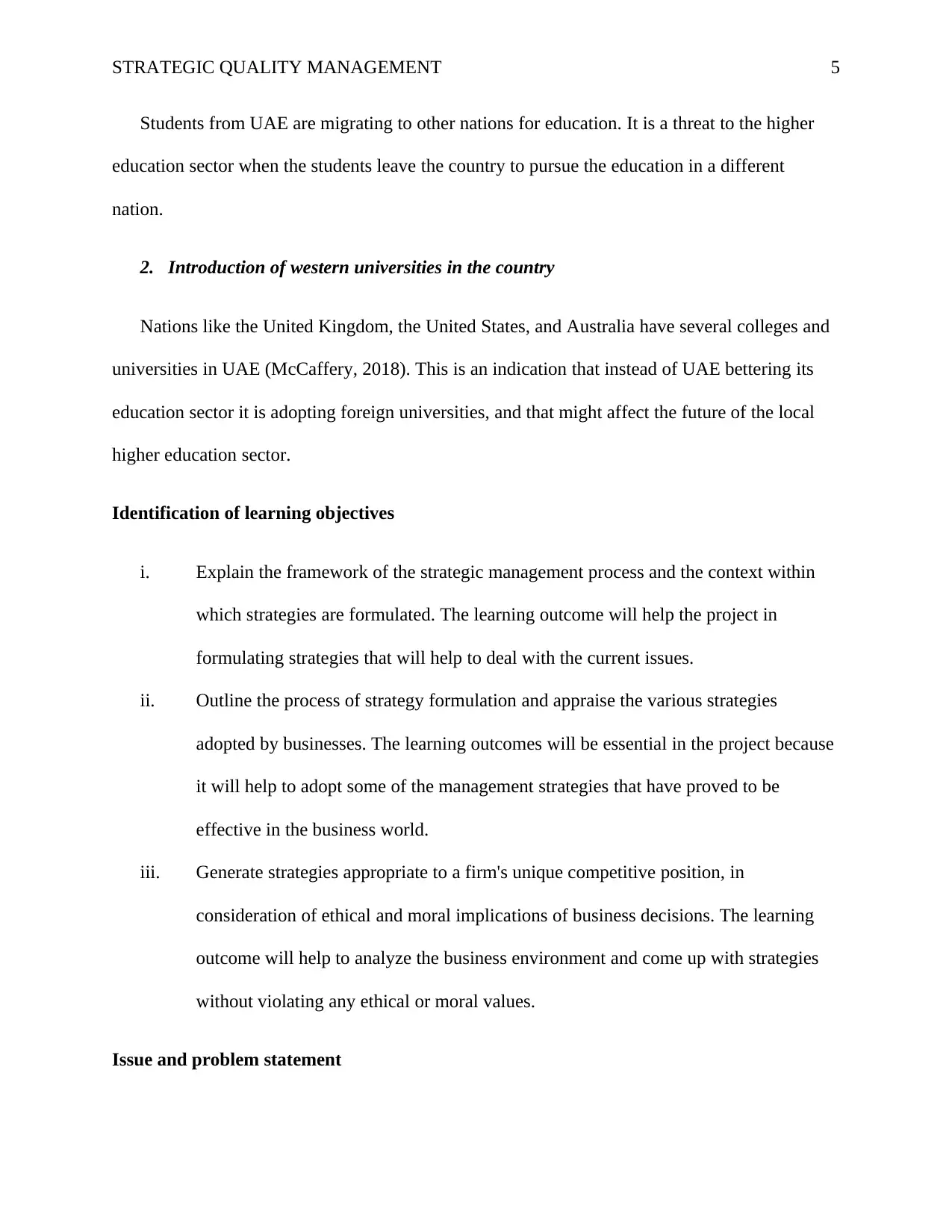
STRATEGIC QUALITY MANAGEMENT 5
Students from UAE are migrating to other nations for education. It is a threat to the higher
education sector when the students leave the country to pursue the education in a different
nation.
2. Introduction of western universities in the country
Nations like the United Kingdom, the United States, and Australia have several colleges and
universities in UAE (McCaffery, 2018). This is an indication that instead of UAE bettering its
education sector it is adopting foreign universities, and that might affect the future of the local
higher education sector.
Identification of learning objectives
i. Explain the framework of the strategic management process and the context within
which strategies are formulated. The learning outcome will help the project in
formulating strategies that will help to deal with the current issues.
ii. Outline the process of strategy formulation and appraise the various strategies
adopted by businesses. The learning outcomes will be essential in the project because
it will help to adopt some of the management strategies that have proved to be
effective in the business world.
iii. Generate strategies appropriate to a firm's unique competitive position, in
consideration of ethical and moral implications of business decisions. The learning
outcome will help to analyze the business environment and come up with strategies
without violating any ethical or moral values.
Issue and problem statement
Students from UAE are migrating to other nations for education. It is a threat to the higher
education sector when the students leave the country to pursue the education in a different
nation.
2. Introduction of western universities in the country
Nations like the United Kingdom, the United States, and Australia have several colleges and
universities in UAE (McCaffery, 2018). This is an indication that instead of UAE bettering its
education sector it is adopting foreign universities, and that might affect the future of the local
higher education sector.
Identification of learning objectives
i. Explain the framework of the strategic management process and the context within
which strategies are formulated. The learning outcome will help the project in
formulating strategies that will help to deal with the current issues.
ii. Outline the process of strategy formulation and appraise the various strategies
adopted by businesses. The learning outcomes will be essential in the project because
it will help to adopt some of the management strategies that have proved to be
effective in the business world.
iii. Generate strategies appropriate to a firm's unique competitive position, in
consideration of ethical and moral implications of business decisions. The learning
outcome will help to analyze the business environment and come up with strategies
without violating any ethical or moral values.
Issue and problem statement
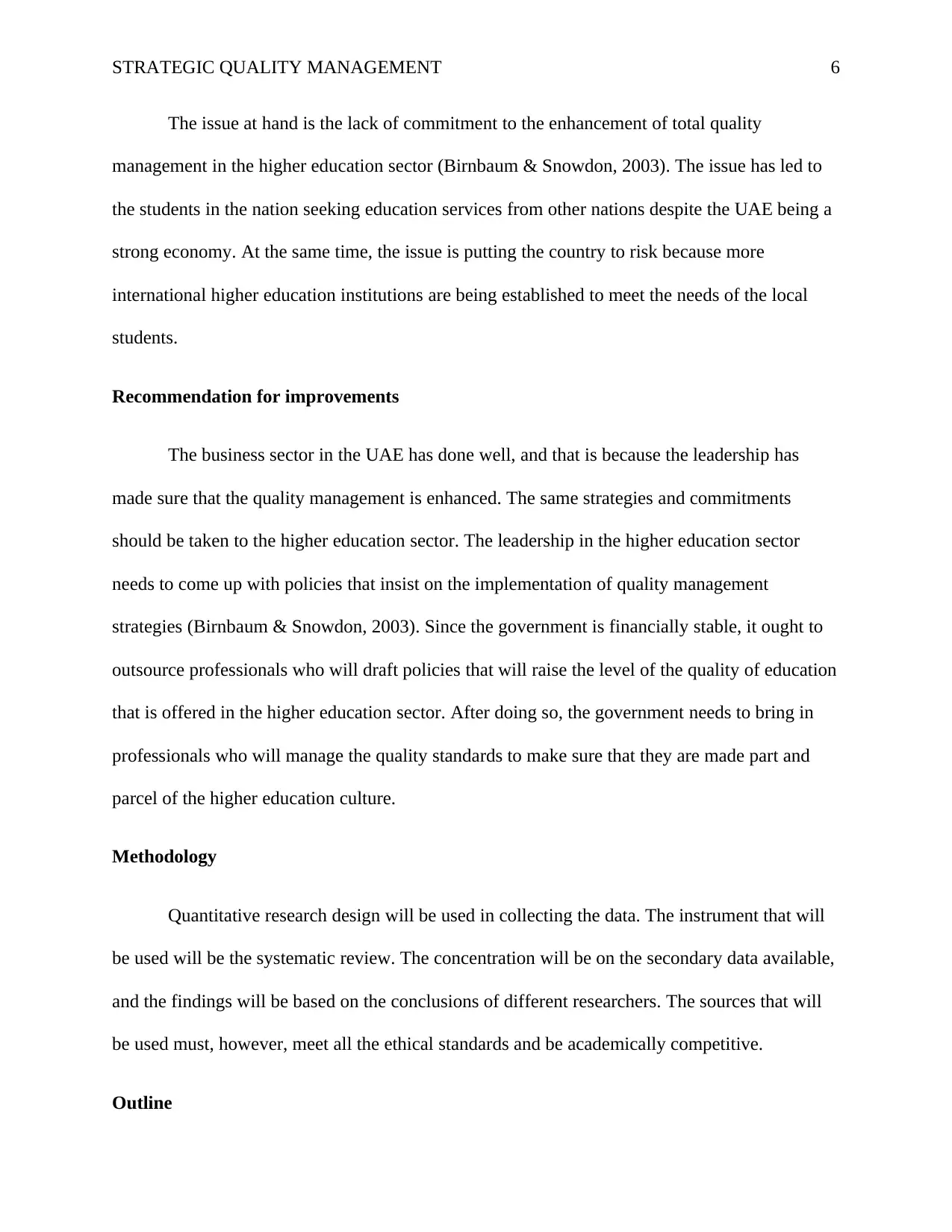
STRATEGIC QUALITY MANAGEMENT 6
The issue at hand is the lack of commitment to the enhancement of total quality
management in the higher education sector (Birnbaum & Snowdon, 2003). The issue has led to
the students in the nation seeking education services from other nations despite the UAE being a
strong economy. At the same time, the issue is putting the country to risk because more
international higher education institutions are being established to meet the needs of the local
students.
Recommendation for improvements
The business sector in the UAE has done well, and that is because the leadership has
made sure that the quality management is enhanced. The same strategies and commitments
should be taken to the higher education sector. The leadership in the higher education sector
needs to come up with policies that insist on the implementation of quality management
strategies (Birnbaum & Snowdon, 2003). Since the government is financially stable, it ought to
outsource professionals who will draft policies that will raise the level of the quality of education
that is offered in the higher education sector. After doing so, the government needs to bring in
professionals who will manage the quality standards to make sure that they are made part and
parcel of the higher education culture.
Methodology
Quantitative research design will be used in collecting the data. The instrument that will
be used will be the systematic review. The concentration will be on the secondary data available,
and the findings will be based on the conclusions of different researchers. The sources that will
be used must, however, meet all the ethical standards and be academically competitive.
Outline
The issue at hand is the lack of commitment to the enhancement of total quality
management in the higher education sector (Birnbaum & Snowdon, 2003). The issue has led to
the students in the nation seeking education services from other nations despite the UAE being a
strong economy. At the same time, the issue is putting the country to risk because more
international higher education institutions are being established to meet the needs of the local
students.
Recommendation for improvements
The business sector in the UAE has done well, and that is because the leadership has
made sure that the quality management is enhanced. The same strategies and commitments
should be taken to the higher education sector. The leadership in the higher education sector
needs to come up with policies that insist on the implementation of quality management
strategies (Birnbaum & Snowdon, 2003). Since the government is financially stable, it ought to
outsource professionals who will draft policies that will raise the level of the quality of education
that is offered in the higher education sector. After doing so, the government needs to bring in
professionals who will manage the quality standards to make sure that they are made part and
parcel of the higher education culture.
Methodology
Quantitative research design will be used in collecting the data. The instrument that will
be used will be the systematic review. The concentration will be on the secondary data available,
and the findings will be based on the conclusions of different researchers. The sources that will
be used must, however, meet all the ethical standards and be academically competitive.
Outline
⊘ This is a preview!⊘
Do you want full access?
Subscribe today to unlock all pages.

Trusted by 1+ million students worldwide
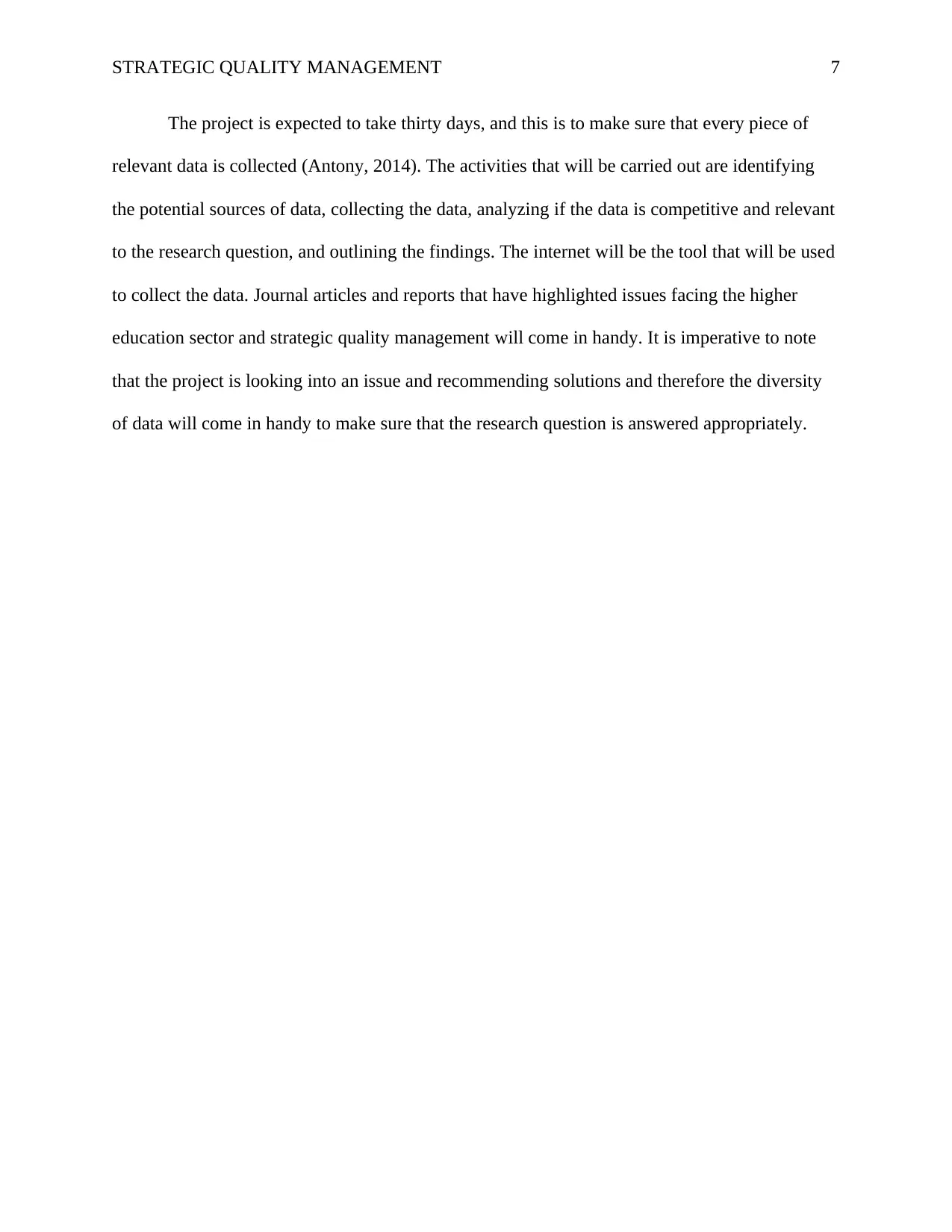
STRATEGIC QUALITY MANAGEMENT 7
The project is expected to take thirty days, and this is to make sure that every piece of
relevant data is collected (Antony, 2014). The activities that will be carried out are identifying
the potential sources of data, collecting the data, analyzing if the data is competitive and relevant
to the research question, and outlining the findings. The internet will be the tool that will be used
to collect the data. Journal articles and reports that have highlighted issues facing the higher
education sector and strategic quality management will come in handy. It is imperative to note
that the project is looking into an issue and recommending solutions and therefore the diversity
of data will come in handy to make sure that the research question is answered appropriately.
The project is expected to take thirty days, and this is to make sure that every piece of
relevant data is collected (Antony, 2014). The activities that will be carried out are identifying
the potential sources of data, collecting the data, analyzing if the data is competitive and relevant
to the research question, and outlining the findings. The internet will be the tool that will be used
to collect the data. Journal articles and reports that have highlighted issues facing the higher
education sector and strategic quality management will come in handy. It is imperative to note
that the project is looking into an issue and recommending solutions and therefore the diversity
of data will come in handy to make sure that the research question is answered appropriately.
Paraphrase This Document
Need a fresh take? Get an instant paraphrase of this document with our AI Paraphraser
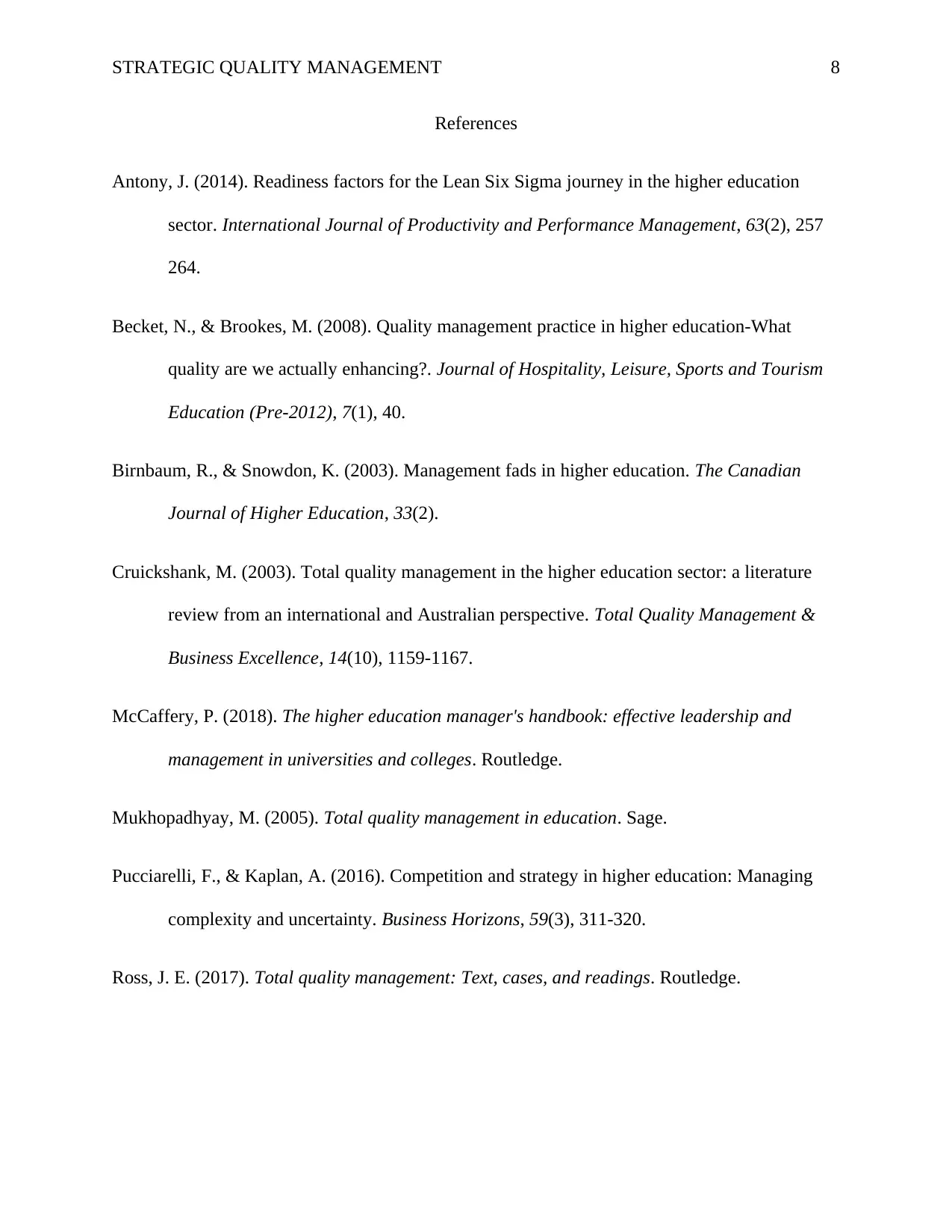
STRATEGIC QUALITY MANAGEMENT 8
References
Antony, J. (2014). Readiness factors for the Lean Six Sigma journey in the higher education
sector. International Journal of Productivity and Performance Management, 63(2), 257
264.
Becket, N., & Brookes, M. (2008). Quality management practice in higher education-What
quality are we actually enhancing?. Journal of Hospitality, Leisure, Sports and Tourism
Education (Pre-2012), 7(1), 40.
Birnbaum, R., & Snowdon, K. (2003). Management fads in higher education. The Canadian
Journal of Higher Education, 33(2).
Cruickshank, M. (2003). Total quality management in the higher education sector: a literature
review from an international and Australian perspective. Total Quality Management &
Business Excellence, 14(10), 1159-1167.
McCaffery, P. (2018). The higher education manager's handbook: effective leadership and
management in universities and colleges. Routledge.
Mukhopadhyay, M. (2005). Total quality management in education. Sage.
Pucciarelli, F., & Kaplan, A. (2016). Competition and strategy in higher education: Managing
complexity and uncertainty. Business Horizons, 59(3), 311-320.
Ross, J. E. (2017). Total quality management: Text, cases, and readings. Routledge.
References
Antony, J. (2014). Readiness factors for the Lean Six Sigma journey in the higher education
sector. International Journal of Productivity and Performance Management, 63(2), 257
264.
Becket, N., & Brookes, M. (2008). Quality management practice in higher education-What
quality are we actually enhancing?. Journal of Hospitality, Leisure, Sports and Tourism
Education (Pre-2012), 7(1), 40.
Birnbaum, R., & Snowdon, K. (2003). Management fads in higher education. The Canadian
Journal of Higher Education, 33(2).
Cruickshank, M. (2003). Total quality management in the higher education sector: a literature
review from an international and Australian perspective. Total Quality Management &
Business Excellence, 14(10), 1159-1167.
McCaffery, P. (2018). The higher education manager's handbook: effective leadership and
management in universities and colleges. Routledge.
Mukhopadhyay, M. (2005). Total quality management in education. Sage.
Pucciarelli, F., & Kaplan, A. (2016). Competition and strategy in higher education: Managing
complexity and uncertainty. Business Horizons, 59(3), 311-320.
Ross, J. E. (2017). Total quality management: Text, cases, and readings. Routledge.
1 out of 8
Related Documents
Your All-in-One AI-Powered Toolkit for Academic Success.
+13062052269
info@desklib.com
Available 24*7 on WhatsApp / Email
![[object Object]](/_next/static/media/star-bottom.7253800d.svg)
Unlock your academic potential
Copyright © 2020–2026 A2Z Services. All Rights Reserved. Developed and managed by ZUCOL.




